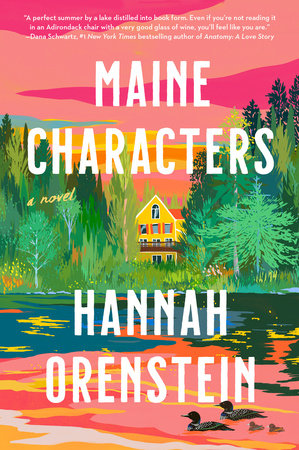Chapter One
Vivian
The exit off the highway is so sharp, Vivian Levy throws her hand over the urn so it doesn't topple off the passenger seat. She's never liked to drive these dangerous roads, but she had no other choice. She needed to get out of New York City, get out of her head-fast.
She'd unearthed her dad's ancient truck from the garage that morning; it hadn't been used since last summer. Seven hours later, she'd finally made it to Fox Hill, Maine. The town center slips by with blink-and-you'd-miss-it speed. Everything is tucked within two blocks: There's the pub with peeling paint and a packed parking lot, the ramshackle market, Miss Pancakes across from the bank, and the seafood shop that closed down three years ago. The storefront's sign, featuring a faded cartoon lobster, still sits in the darkened window. The busiest intersection doesn't even have a stoplight.
As she takes the tight bend around the lily-splattered pond, the radio crackles between stations. A John Mellencamp song ends and a biblical sermon begins. Vivian punches it off, even though there's been too much grim silence lately. She misses the murmuring hum of the dinner rush, the warbling busker on the West 4th Street subway platform, and even her opera aficionado neighbor in 5F.
The cracked pavement road turns to dirt as she winds through a thicket of trees, rolling past a field, a buckling white fence, an imposing clapboard house with a sign claiming 1797 construction. The steep hill dips and rises like a roller coaster. She (barely) learned to drive here.
When she reaches the clearing at the top, lush scenery splays out in front of her: the cookie-cutter shapes of emerald pines, the long-shuttered little red schoolhouse on the dusty road, and, beyond it all, the sapphire waters of Fox Hill Lake under a bright sky dolloped with clouds. The first glimpse of this technicolor view catches her off guard every summer. New York City's concrete sidewalks, gray skyscrapers, and grime make it easy to forget Maine's vivid colors.
The GPS cuts out, but Vivian doesn't need it anymore: left at the barn, right at the fork. She crawls along at ten miles per hour, watching out for potholes and deer. Their house-her house, she corrects herself-is most of the way down the dead-end street. She's not ready to keep up a place like this. She doesn't know the first thing about winterizing the dock or fixing the boiler when it breaks. The responsibility is too much for one person, especially Vivian.
Turning into the driveway, she sighs at the familiar sight of the three-story honey-colored house. One apple-red shutter hangs askew-something her dad had been meaning to fix. Arriving after a year away is like slipping into a well-worn but not particularly beloved old sweatshirt. This time, though, an unfamiliar Chevy sedan is parked out front. Vivian's pulse ticks up as she notices the house's lights are on. Hank was an only child who inherited this property after his own parents' untimely death; she doesn't have any aunts or uncles who could be poking around the house. Nobody should be here.
It's a humid eighty degrees, but dread turns her blood cold. Steeling herself, she gets out of the car. Her breath is shallow as a stranger pushes through the screen door. The woman squints at her through pale pink-rimmed glasses; then her warm brown eyes widen. She looks about Vivian's age, with a blond ponytail and a furrowed brow. The uninvited, though admittedly not very threatening, guest jogs down the front walk, flip-flops thwapping against the concrete, and stops short in the driveway.
"Hi," she says, wringing her hands.
Vivian's heart beats faster. She removes her oversized sunglasses. "Can I help you?"
The blonde gapes, then finds her voice. "Do you know who I am?"
A haughty response tumbles loose before Vivian can think it through. "No. Should I?"
The woman's posture wilts like a week-old bouquet. "I guess not," she says.
Guilt flashes through Vivian, but she has every right to stay guarded. This woman was in her house, after all.
The stranger takes a deep, shuddering breath and pauses to compose herself. When she looks up again, her jaw is set. "I'm Lucy Webster."
She scans Vivian's face as if she's hoping for a flicker of recognition.
Vivian stiffens. "Okay. And?"
"I . . . I'm just . . ."
As she grasps for an explanation, Vivian's anger surges up like bile. This woman is solid, three-dimensional, alive, close enough that Vivian can watch the pink creep into her cheeks. Unless she's wildly mistaken, Lucy is proof that she wasn't crazy-she was lied to, again and again.
"I'm sorry, this is my property," she snaps. "You need to leave."
"Wait," Lucy says desperately.
But Vivian can't. The shock is simmering under her skin, ready to boil over; she could scream.
"I'm serious. Go."
Sixteen years of secrecy and gaslighting are about to erupt. She needs to be alone when she falls apart.
"No," Lucy says, looking surprised by her own strength.
Vivian glares, incredulous. "No?"
"Please. Listen."
It would take ten seconds to push past Lucy into the house and lock the door behind her, but then Vivian might never have a chance to learn the truth. Lord knows she won't get it from her mother.
She exhales. "What?"
"You're Hank Levy's daughter?"
Vivian crosses her arms. "Yeah."
With a nervous smile, Lucy says, "So am I."
So there it is. With a sharp bark of laughter, Vivian says, "You have to be fucking kidding me."
Lucy's face pinches in something like pity or disappointment. "I'm not."
Vivian is dizzy. It's one thing to have a wild theory about her dad's shady behavior; it's another to have it confirmed. She goes on the offensive.
"Prove it."
Lucy looks around the overgrown yard. "His name is actually Henry. He was born in Newton, Massachusetts, on August 20, 1970. He went to Columbia, he owned a-"
Vivian interrupts, rolling her eyes. "Congratulations on googling him."
She'd imagined this moment would feel victorious, but instead, it's sickening.
"He . . . he's allergic to walnuts! He's played poker with the same group of guys for twenty years, and last time he won, he got a pair of tickets to the Yankees-Sox game. He bought the living room speakers in there with his first bonus check from his first-ever banking job. And-"
No. Vivian doesn't want to hear this. Any of it. She takes aim with her only weapon.
"You don't even know, do you?"
Lucy tilts her head. "What?"
She fires. "I'm sorry to be the one to tell you this," Vivian says, not feeling very sorry at all. "He's dead."
Lucy
Lucy has been submerged in a suffocating kind of despair ever since Memorial Day weekend. Vivian's words yank her up, force her to focus.
"He's dead?"
Vivian crosses her arms. "Gone."
"When did it happen?" Lucy manages.
"Two weeks ago."
Lucy's jaw sags. She should've noticed something was wrong sooner. Hank never returned the voicemail she left on Father's Day, and he didn't answer her texts about his upcoming annual visit, either. Under different circumstances, she would've thought more of her dad's silence. But for the past six weeks, Lucy has barely been able to peel herself out of bed. She's spent her days trudging through the motions of teaching classes and grading final exams, but it all feels wildly wrong, like she's a ragged sea urchin trapped behind aquarium glass. Each night has been a forty-year stretch of insomnia. When school let out at the end of June, she burrowed under the covers in her childhood bedroom at her mom's house and stayed there for a week, avoiding the filtered daylight slipping through the blinds.
She'd been jarred back to reality when she finally noticed the calendar had melted into July, the month she and her dad always spent together at the lake. She tried calling again to coordinate their plans. She wanted to know when he would arrive or if his schedule had changed. Again, nothing. Her mom told her not to worry. "Wouldn't be the first time he disappeared," Dawn had said with a sigh.
That didn't make Lucy feel any better. Finally, this morning, she drove across town, praying the whole way that she'd find him here. Instead, the house was locked. Dark. Quiet. She pulled the spare key from under the terra-cotta planter; Hank kept saying he'd make her a copy but never got around to it. Inside, she flicked on a light in the shadowy kitchen, illuminating a fine layer of dust over the linoleum floors.
"Dad, are you here?" she called. "Dad?"
She prowled upstairs, more anxious with every step. The loftlike space has few interior walls and doors, which made Lucy's exercise of checking every inch somewhat pointless. The only places for privacy are the two bathrooms. It's a terrible house for keeping secrets.
Panic prickled Lucy's skin as the final bedroom turned out to be empty. Should she call the police? File a missing person's report? How could she have languished in a miserable stupor for so long that she failed to notice that something was wrong? Then she heard tires crunching on gravel. She darted to the window, relieved beyond belief to see Hank's pickup truck pulling into the driveway.
Except it wasn't her dad-it was Vivian. Lucy's never glimpsed a celebrity, but she imagines it would feel like this: a nerve-racking smack of one-sided recognition. Vivian is tall like Lucy, but thinner, with a mane of smooth, dark brown hair. Diamond studs wink from her ears, and a buttery leather bag dangles from the crook of her arm. Her voice is a touch higher than the cool alto Lucy's been imagining all these years. She'd fantasized countless times about what it'd be like to finally meet her, but none of those scenarios looked like this one. She'd always pictured Hank introducing them.
e
Lucy sinks to the driveway. Crumbling in front of Vivian is mortifying, but she can’t help the tears. Vivian steps back; her mouth twists in contempt. Shuddering, Lucy wipes her cheeks, then instantly regrets it. The concrete’s dirty residue transfers to her damp skin. Rubbing it away with the back of her hand only spreads it, which makes her feel even more pitiful.
Vivian exhales hard. "Look . . ."
Lucy blinks up at her, embarrassed and afraid. "What?"
She has no problem leading a class of twenty, but one-on-one, up against a woman she's daydreamed about for so long, her confidence is paper thin.
Her half-sister glances around uneasily. Lucy isn't sure if she's hoping that someone else will magically appear to deal with this mess, or if she'd be humiliated if the neighbors witnessed it. She comes over, drops to Lucy's level, and freezes. They stare at each other. Lucy's head feels like the swampy sludge at the bottom of the lake-thick, grimy, like she could be sucked under the muck. She can only imagine what this polished New Yorker thinks of her saggy cutoffs and greasy ponytail, and wonders if Vivian can see the familial resemblance. It's there, if you look closely. At least that's what she tells herself. Up close, Lucy notices there are heavy, shadowed half-moons under her eyes.
Vivian gives Lucy's shoulder a brusque squeeze. "I'm sorry."
Vivian
Vivian is flooded with dumbstruck fury. She doesn't like watching Lucy weeping over "Dad"-Vivian's dad!-before shuffling inside to rummage for lemon-ginger tea bags like she owns the place. She resents when Lucy takes the chipped yellow mug with the New York City skyline, the one Vivian always uses. It's so old, the Twin Towers still balance on the southern tip of Manhattan.
Vivian had been at work for barely fifteen minutes when she got the news. It was 2:30 on a Sunday afternoon, earlier than she normally worked and busier than usual because of Father's Day. She'd been relieved to have a hectic workload, which would keep her too occupied to stew over what had happened that morning. Her phone buzzed in her back pocket as she printed off the final version of Della's new summer wine list-there's the Portuguese albariño she can't get enough of, and a buttery white Burgundy that's guaranteed to sell well. It was only Celeste, her mother, so she ignored the call. She'd just seen her parents an hour ago at their own family brunch. Chaos aside, holiday shifts are easy money: People are happy to throw around tips. That day, the dining room was a sea of dads and grandpas; some were in ties and blazers while others tried to look cool in high-end sneakers. Colorful tissue paper poked out of shiny gift bags. A table that appeared to seat a man's first and second wife had racked up the weekend's highest alcohol bill thus far.
Her phone went off again as a waiter summoned her to a table interested in prosecco. When she left to grab the bottle, she texted Celeste, At work.
But then it rang again. This scared her. They rarely spoke on the phone-they typically didn't have much to say to each other. She ducked into a corner of the kitchen to answer the call.
"What is so urgent?" she hissed. Behind her, pots clanged, plates clattered.
She heard her mother suck in a breath. "I don't know how to tell you this."
Her shaking voice was all the information Vivian needed. "Tell me what?"
A sob caught in Celeste's throat. Vivian had never heard her mother cry like this before.
"It's your father. I just got a call. He's gone."
"Gone?"
"Dead. He collapsed on the subway."
"No," Vivian whispered, welling up.
This couldn't be happening. He was fifty-four. Healthy. He'd been right there in front of her that very morning. If she had known those would be her last words to him, she wouldn't have been such a massive bitch. What had she done?
She slid down the wall and curled over her knees, but she didn't cry. Through hiccupping sobs and incomprehensible wails, Celeste relayed everything she knew-which wasn't much. Vivian took it all stoically. One of them had to keep it together, and anyway, this was all her fault. The kitchen was eerily silent when she stood up. She could sense four pairs of ears straining toward her.
"Well, happy Father's Day, everybody." Her voice cracked. "My dad just died."
If she'd said anything more sincere, she would've lost it. The kitchen staff clambered to comfort her. Through the crush of bodies, she saw her boss, Oscar, do a double take as he walked by.
"Is everything all right?" he asked, entering the kitchen cautiously.
Copyright © 2025 by Hannah Orenstein. All rights reserved. No part of this excerpt may be reproduced or reprinted without permission in writing from the publisher.







